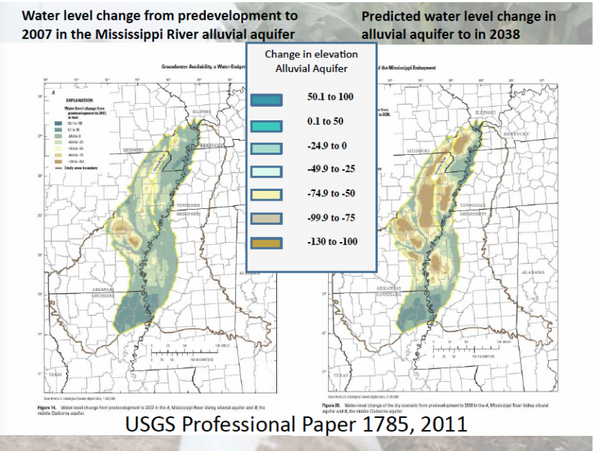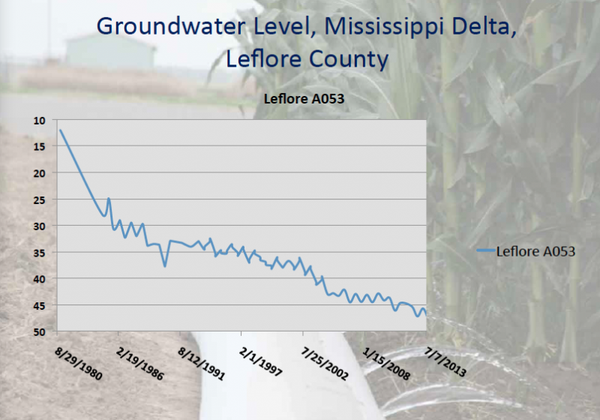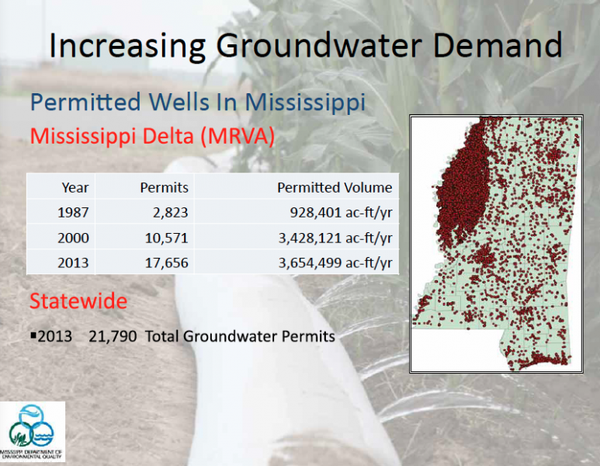
A declining aquifer in the Mississippi Delta is not only concern about an important resource for the region’s agriculture, it also represents an economic challenge, says Chip Morgan.
“We have 35 years of data showing about a 1 foot to 1.5 foot per year decline in the aquifer Delta-wide,” he said at the annual meeting of the Mississippi Agricultural Consultants Association.
“An increase in irrigated acreage is placing a greater demand on groundwater levels, and we are still learning about primary sources of recharge — a process that occurs mainly by recharge from rainfall and streams, and inflow from the Mississippi River and bluff hills to the east.”
Stay current on what’s happening in Mid-South agriculture: Subscribe to Delta Farm Press Daily.
“Morgan, who is executive vice president of the Delta Council, says steps must be taken by agriculture to halt the decline or risk having to comply with regulations that could be restrictive and onerous.

“It’s going to require growers to adapt tools and techniques to use water more efficiently, and for many it will necessitate a different way of thinking. Depending on location, many growers don’t understand why there is even a concern about water, because they haven’t noticed any difference.
SEE MORE THAN 200 PHOTOS OF THE 2015 MID-SOUTH FARM & GIN SHOW
Look through our photo album to see how many people you know. Who knows, maybe you’re there.
“But when they start metering their wells, in most cases they aren’t drawing the same amount of water in August as when they started irrigating in May. Anyone farming or consulting in the Delta knows that when you‘re not getting as much water the last time you irrigate your soybeans as you did the first time in the season, there’s a change going on underground.”
For the foreseeable future, Morgan says, “agriculture is going to need water, if we’re going to be competitive and be able feed a growing world population.”
Federal/state regulatory authority

DAVID SHORT, DuPont Company, Starkville, Miss.; Calvin Gowlin, Pioneer, Carrollton, Miss.; Alan Swoope, Greenpoint Ag, Yazoo City, Miss.; and Bert Falkner, Land Services, West Point, Miss., were among those attending the annual meeting of the Mississippi Agricultural Consultants Association.
Most people don’t know, he says, that water quality is governed by federal regulation, but water supply is regulated by the state. In Mississippi, the Department of Environmental Quality has authority over all the waters. Their Commission on Environmental Quality and Permit Board are mandated under state law to ‘conserve and prevent the waste or unreasonable use of the waters of the state.’
Under the state of Mississippi Water Law, Code of 1972, all water, whether on the surface of the ground or underneath the surface, belongs to the people of the state and is subject to regulation. Regulations established by the commission give it authority to “require any permit holder to file such reports as are deemed necessary for proper water management.”
In 2013, there were 21,790 groundwater permits in the state; by far the heaviest concentration was in the Delta, with 17,656 permitted wells.
SEE MORE THAN 200 PHOTOS OF THE 2015 MID-SOUTH FARM & GIN SHOW
Look through our photo album to see how many people you know. Who knows, maybe you’re there!
“This is not just a Delta issue, or even just a Mississippi issue,” Morgan says. “It’s much bigger than that. It takes a lot of water just to produce one pound of chicken (468 gallons) or beef (1,799 gallons), or a pound of wheat (132 gallons) or rice (449 gallons). We want anyone to be able to grow any crop they want to in any year — even if it’s the crop that’s the thirstiest, but the market signals favor it.”
As part of a plan, with input from a wide range of stakeholders, a voluntary effort is under way for farmers to cooperate in installing meters on 10 percent of the wells in the Delta.
“We’ve just recently passed the first milestone, with 5 percent signed up,” he says, “and this time next year, we’ll need to have another 5 percent. We either get 10 percent metering done voluntarily or it becomes mandatory.”
This will involve farmers voluntarily agreeing to meters on 10 percent of wells in a county, and reporting water usage by February 2016. Voluntary is 10 percent of wells in a county and reporting water usage by Feb. 2016.
Grower cooperation important
“Under a mandatory scenario, every farm operator would have to have 10 percent – that’s quite a difference,” Morgan says. “We want to make this work, and we’re soliciting everyone’s cooperation in this very important endeavor.
“If we don’t do this, the law is very clear: We’ve got to do something else, and we don’t know what that something else might be. Mississippi is the only state that’s getting $5 million in incentives for producers to adopt irrigation management systems that work.
“There’s a reason for that — everyone in the state worked together to show that we’re serious about this challenge. Farmers and consultants are making a big difference by using computerized hole selection in polypipe, using moisture sensors, surge valves, and other systems.
Time is not our friend in this,” Morgan says. “We didn’t get where we are now in 10 years, or 20 years, and we’re not going to reverse this trend in three years or 10. But we can start making progress toward balancing this water use picture and achieving sustainability in the future.
“We’ve got to get beyond the ‘me’ issue, because the aquifer belongs to everyone. If the Delta doesn’t address this in a unified effort, we could see the legislature do it, or federal agencies, or the courts — and I don’t think we want to go any of those routes.
Mississippi “is extremely fortunate that we have a regulatory agency like the Department of Environmental Quality that understands that the law also says water must be used for its highest beneficial use, whether it’s public water supply, industrial water supply, or agriculture,” Morgan says.
“They recognize agriculture as the biggest industrial complex in the state, both in the Delta and outside the Delta. They view this as a problem that must be solved, but that it will be best solved without more regulation. That’s a positive thing for everyone.
MORE INFORMATIVE IRRIGATION STORIES FROM FARM PRESS
Precision irrigation tools bring water savings to southern growers
Three keys to 300-bushel corn: sunlight, water, and nitrogen
There are things we can do through agricultural engineering, technology, and systems such as PHAUCET, Pipe Planner, and others that can make a 20 percent, 30 percent, or greater difference in water savings, lowering production costs without impacting yield.
“We need everyone’s cooperation in the voluntary well metering effort and in adopting tools and techniques that can help to help deal with these important issues.”
About the Author(s)
You May Also Like




